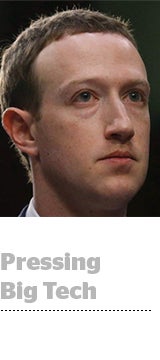Here’s today’s AdExchanger.com news round-up… Want it by email? Sign up here.
Big Grilling
Mark Zuckerberg, Jack Dorsey and Sundar Pichai were back for more on Thursday during another Senate Judiciary hearing at which their respective platforms – Facebook, Twitter and Google — were again criticized for anticompetitive practices, misinformation and an array of social problems. Appearing before a House panel Thursday for the first time since the Jan. 6 riot at the US Capital, the CEOs were grilled by lawmakers from both parties for holding too much sway over information, and the role of social media in fomenting the attack. According to the Wall Street Journal, Rep. Mike Doyle, a Democrat, said that the attack — and the movement that motivated it — “started and was nourished on your platforms.” Lawmakers said the companies operate with little or no accountability, calling for regulations, and Doyle even requested an audit of their technologies. Zuckerberg pushed back, and laid out Facebook’s efforts to deal with harmful or false content. “It’s not possible to catch every piece of harmful content without infringing on people’s freedoms in a way that I don’t think we’d be comfortable with as a society,” he said. Pressed on Facebook’s responsibility for the Jan. 6 event, he said, “I believe that the former president should be responsible for his words and that the people who broke the law should be responsible for their actions.” Read on.
Big Spenders
Speaking of the hearing … two hours in, Rep. Bill Johnson (R-Ohio) likened the CEOs of big tech to those from large tobacco companies, and accused the Silicon Valley firms of being equally dangerous to society, according to the WSJ. And he may be on to something. When it comes to corporate lobbying spend, Facebook and Amazon spent almost twice as much as oil giant ExxonMobil and tobacco company Philip Morris in 2020, according to a new report published by Public Citizen, a progressive consumer rights advocacy group. Business Insider reports that Amazon increased its spending on lobbying efforts by 30% from 2018 to 2020 to reach $18.7 million, while Facebook spent 56% more in the same period to reach around $19.6 million. “The foundation of the Big Tech companies’ influence are their lobbying teams, which use campaign contributions, existing relationships, and past experience to swing policy in their favor,” Public Citizen said in the report. We’ll see just how much that influence pays off following the Senate Judiciary hearings.
Roaring ’20s?
With the rollout of COVID-19 vaccines in full swing, it’s safe to say that consumers are beginning to feel more optimistic. According to Nielsen, with COVID restrictions easing, 40% of adults 18 and older say a new or used vehicle is in their future, and 20% say they intend to buy a new home in the next 12 months. And 73% of Americans say they’re either very, or somewhat, eager to plan or book a vacation (who isn’t dying to go away these days?). It appears that brands and advertisers are starting to catch up as folks start spending again. According to Nielsen, based on ad spending trends, many brands have turned a corner from mid-2019, when most of the year’s ad spend decline occurred. By Q4 2020, ad spend was just 5% below the prior year, compared with much steeper year-over-year declines —nearly 30% in Q2 2020 — in the previous two three-month periods. With consumers itching to get out of the house and do things — which involves spending money — brands and marketers need to focus on how that’s going to play out among individual consumers and consumer groups. Read on.
But Wait, There’s More!
Omnicom Media has struck a deal with BERA, a predictive brand tech SaaS platform that measures brand equity and purpose scores, in order to fuse “brand love” into media targeting. [Ad Age]
OpenX released the findings of a recent survey that examines how digital media publishers are using Prebid to manage their programmatic advertising. Hint: it’s pretty critical. [release]
Epsilon and Verizon Media are expanding their partnership to strengthen identity and build on activation capabilities. [Yahoo! Finance] Meanwhile, Verizon Media’s third-party cookie replacement, ConnectID, is getting a lift from publisher CafeMedia, which will start supporting the email-based identifier. [Adweek]
Consumer identity management expert Infutor has introduced Total Consumer Insights, a third-party dataset that provides privacy-compliant behavioral and household attributes. [release]
AppsFlyer and MMA surveys show a disconnect between how smartphone owners and marketers think of data use and privacy. [Martech Series]
AKQA vets have launched a new global agency, Said Differently. [CampaignUS]
You’re Hired
Aisle Rocket has hired Mike Paley as chief growth officer. [Street Insider]
Tinuiti has added three industry leaders to it board: Kevin Mayer, former chairman of Disney’s Direct to Consumer International Segment and previously CEO of TikTok; Anneka Gupta, president and head of product & platforms at LiveRamp; and George Gallate, former global chairman and CEO of Havas Digital. [release]











